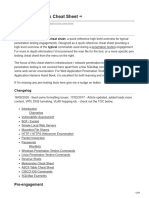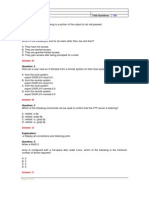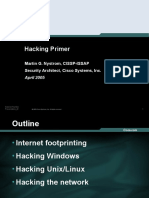How To Become A Pentester
How To Become A Pentester
Uploaded by
gouarirCopyright:
Available Formats
How To Become A Pentester
How To Become A Pentester
Uploaded by
gouarirOriginal Description:
Original Title
Copyright
Available Formats
Share this document
Did you find this document useful?
Is this content inappropriate?
Copyright:
Available Formats
How To Become A Pentester
How To Become A Pentester
Uploaded by
gouarirCopyright:
Available Formats
How
To Become a Pentester HackingLoops.com
I used to be where you are - most likely a technical person not fully
enjoying what you do at your day job and wanting to make the move to
a job that you would actually enjoy in the security field.
For me specifically, that was conducting vulnerability assessments,
penetration testing, hacking, auditing and anything in IT Security.
On the About Me page I described a little bit about how I got where I am.
Now Im going to share with you exactly what I would do if I could do it
all over again, but first Im going to answer a few popular questions
about the industry.
Is a Computer Science degree necessary to be a pentester?
So
you
want
to
learn
how
to
hack
and
think
you
need
a
degree.
If
you
have
the
time
and
the
money
to
pursue
a
degree
in
computer
science,
by
all
means
take
the
opportunity
and
pursue
it.
While
it
is
not
necessary
to
have
this
degree,
it
would
be
one
of
the
optimal
paths
to
take
under
perfect
conditions
to
get
your
foot
in
the
door
at
an
entry-level
position.
How To Become a Pentester HackingLoops.com
You might be pursuing or have other technical degrees already that
could substitute nicely. I personally had a Computer Information
Systems (CIS) degree when I set out on my journey.
To go a bit further I decided to get a Masters in Information Security and
Assurance, but this isnt necessary for everyone. If you were coming
from a non-technical field though, a switch to a more technical masters
program could be just the path for you.
Don't let the BS and MS degree talk deter you though if getting one isnt
an option. Technical degrees are always an option as well.
While you will always find that companies are looking for a degree, if
you have the right experience and certifications it surely wouldnt hold
you back at all.
Lets take a look at two sample information security job postings:
How To Become a Pentester HackingLoops.com
Does where I go to school matter?
In my opinion, it doesn't matter where you obtain your degree. You
would just use this as a stepping stool to gain some fundamentals and
get your foot in the door so that potential clients feel comfortable with
you. Sometimes they will actually ask for your resume and a degree
looks good on there.
Surprisingly, Vo Tech and Community Colleges often have programs
that are just as good as the more prestigious schools. Many times, you
can get just as good an education for half the cost and in half the time.
What matters most though is the amount and type of experience that
you will be able to gain along the way as was hinted in the graph above.
You should note that even the most expensive college or university does
not necessarily have the best educational programs for this particular
field. At this point in time this field is in its infancy, which also means
How To Become a Pentester HackingLoops.com
that this is actually a great time to get into the field before it becomes
crowded.
Most computer science programs available today place the majority of
emphasis on programming, although I foresee them moving heavily in
the cyber security direction over time, including Pentesting.
Some schools now even have cyber security degrees, so if you know for
sure that this is the area you want to be in then I would take a hard look
at that.
That large programming aspect of the computer science programs will
also be very beneficial to you later without a doubt.
Which certifications should I have?
Certain certifications will be indispensable when it comes to getting
your foot in the door, especially if you pick the right ones.
It may seem like putting the cart before the horse by getting one of these
before you get the experience and it is, but having one will give you a leg
up over another candidate who doesn't have one.
It is also very doable to get one in a relatively short period of time,
unlike a degree.
This is why if you already have a Bachelors degree I wouldnt
recommend going back to get a computer science degree, but instead
going after some of the sought after certifications such as: SANS GPEN,
GWPT, GSEC, GAWN; Offensive Security OSCP, OSWP, OSCE, OSEE; EC-
Council C|EH, ECSA, ECSA L|PT.
There are also others that you can find with a simple Google search or
by looking at job postings online.
While its not necessary that you obtain all of these certifications, you
will want to be able to prove that you have the required experience to
perform the job and some of these certifications will help you do just
How To Become a Pentester HackingLoops.com
that.
Youll also want to consider some networking certifications such as
Network+ to start, or even better the CCNA. You will commonly see the
CCNA certification listed on pentesting job requirements.
These certifications will go a long way towards helping you obtain a
penetration-testing job and can be just the thing that propels you ahead
of another candidate vying for the same job.
What experience should I have?
Dont make the mistake of getting a ton of certifications and forgetting
that above all else experience is king. You may make it to the interview,
but when the interviewer starts asking about experience, things could
start to go downhill fast for you.
While you may not need experience for some entry-level positions, it is
critical to get some if you expect to succeed and for a leg up on other
entry-level applicants.
How To Become a Pentester HackingLoops.com
A solid understanding of networks is also critical for you. You don't
have to be an expert and can learn along the way, but you need to have a
somewhat solid overview of how they work.
I was given an IP address in an interview some years back and asked
what the broadcast address was. You need to be able to answer simple
questions like this, so if you cant you probably need more training in
this area.
Building a home lab network environment is critical for a penetration
tester and will allow you to get a better understanding of penetration
testing, hacking, networking and help you meet the experience
requirement you will need.
You will also want to become well versed in working and testing Web
Applications and Cloud technologies such as SaaS. Web Application
testing is very hot right now and you might have already noticed this
while looking at some of the new pentesting positions available.
Because everything is moving out to the Cloud, companies are actively
looking for people with the specific skills to test these applications and
being advanced in this area can help you stand out from the
competition.
How To Become a Pentester HackingLoops.com
Another great way to get experience is by reaching out to people in the
industry already and working for them for free in your spare time.
This will give you documentable work experience beyond your own
home lab and you may even get an opportunity to work with that
company as well.
How To Become a Pentester HackingLoops.com
What skills do I need and is a networking background
required?
You
must
know
the
fundamentals.
That
being
said,
I
part
ways
with
some
in
the
industry
here
as
some
believe
you
need
many
years
of
experience
as
a
network
administrator
or
security
engineer
etc.
first
before
moving
on
to
pentesting.
I
actually
believe
that
this
isnt
a
requirement
and
think
you
can
learn
both
concurrently
depending
on
your
skill
level
and
willingness
to
learn.
They
complement
each
other.
If
you
are
dedicated
you
can
read
both
types
of
books,
take
both
types
of
classes
and
experiment
with
both
sides
of
the
same
coin.
Learning
how
to
pentest
doesnt
prevent
you
from
concurrently
learning
how
networks
work.
However,
learning
how
to
pentest
and
hack
without
learning
how
networks
work
is
never
going
to
happen
for
you,
so
go
get
those
fundamentals
down.
Do I need to know how to code?
While you dont need to be an advanced level coder to penetration test,
it would be very wise to start learning some basic scripting in order for
you to hack together some tools that you need.
The key here is to get some basic things to work, not to build out some
huge application. You might have specific needs according to a
penetration test that you are conducting and may need to tweak an
already existing application or build your own.
You may commonly run into a Metasploit module that doesnt meet
your needs at the moment and you may need to either modify one or
write it from scratch.
How To Become a Pentester HackingLoops.com
Most penetration testers can code in many languages because after you
learn one language it isnt difficult to branch out to others.
In my opinion you should focus on learning Ruby or Python because
most of the code and job prerequisites you will come across will be
written in one of the two. Both are often used in the penetration world
and are the de facto standards. Build it once and then use it forever.
As
you
gain
experience,
you
can
start
to
branch
out
to
some
other
languages
as
well.
This
knowledge
base
will
make
you
more
attractive
in
interviews
and
make
you
a
much
better
pentester.
Start
by
watching
some
YouTube
videos
and
then
go
and
modify
or
try
to
recreate
those
applications
on
your
own.
How To Become a Pentester HackingLoops.com
What is the best way to find a job?
The
best
way
to
find
a
job
is
to
first
look
at
your
current
employer
to
see
if
you
can
tweak
your
position
or
move
to
another
in
the
company.
The
next
best
route
would
be
to
intern
somewhere
if
you
can.
If
you
cant
do
it
those
ways
you
can
always
start
your
search
by
going
to
job
searching
sites
such
as
the
Federal
Government
(USAJobs.gov),
CareerBuilder,
Monster.com,
Indeed.com
and
Dice.com.
Be
on
the
lookout
for
titles
such
as
Information
Security
Analyst,
Information
Security
Auditor,
Information
Security
Engineer,
IT
Security
Consultant,
and
of
course
Penetration
Tester.
Of
course
you
can
search
for
common
keywords
such
as
Kali,
Nessus,
Wireshark,
Metasploit,
Burp
Suite
and
nmap.
These
will
always
vary
and
change
over
time,
but
you
should
be
able
to
come
up
with
a
few
different
combinations
and
find
some
openings
without
issue.
How To Become a Pentester HackingLoops.com
Companies are looking for people who are willing to learn and do what
it takes to get the job done.
If you dont have a specific skill but are willing to pick it up along the
way then it doesn't matter at all. Presenting yourself to the company
that way will significantly increase your chances of obtaining the
position.
When interviewing for my first position, I personally had some good
education but the direct experience wasnt there. However, the
company decided to take a chance on me based on my willingness to
learn and get the certifications I obtained.
How To Become a Pentester HackingLoops.com
How much money do pentesters make?
As
with
any
job
this
depends
on
many
variables,
but
Ive
included
a
general
range
for
you
here:
It
isnt
uncommon
for
entry-level
positions
to
be
between
55k-70k,
mid-
level
to
be
between
70k-100k
and
senior
level
to
be
between
100k-
140k.
How To Become a Pentester HackingLoops.com
If I had to do it all over again this is what I would do:
Step #1: I would evaluate my day job
I would evaluate my current position at my job and see if there was any
way that I could gain some experience right where I am.
If there were a way to focus on some networking fundamentals or
administration fundamentals I would start there. Many of you are
already in technical positions, so take a look around, start reading more
networking/hacking/pentesting books and see how you can apply it all
to your current position.
Step #2: Set up my home lab
At the same time as Im evaluating my day job, I would be setting up a
virtual lab at home to start studying how everything works. To see how
I would do that you can take a look at this page here.
In the process I would start looking at some basic videos on networking,
hacking, pen testing, Ruby and Python. Id utilize SecurityTube
(http://www.securitytube.net/) and YouTube for this. As my skills got
better and my knowledge base expanded I would also expand on this
home lab network as well so I could run more tests.
Step #3: I would get web application testing down
After I got pretty confident on how things work in my own home lab I
would be looking for other web applications and networks to learn on.
OWASP, the Open Web Application Security Project, has an awesome
complete list of vulnerable websites that you can learn on. You can find
that list here:
https://www.owasp.org/index.php/OWASP_Vulnerable_Web_Applicati
ons_Directory_Project#tab=On-Line_apps
How To Become a Pentester HackingLoops.com
Step #4: I would become the go-to security guy
After I became more confident I would then proceed to utilize what Ive
been learning at my current position with permission.
After I got some basic fundamentals down or if I already had the
fundamentals down I would let my manager know that I would be
happy to evaluate the current security situation in my own time if
he/she would allow me.
I would try to position myself as the security guy on the team and make
it my responsibility to learn all that I could. This would get my resume
looking pretty good when it comes to experience and allow me to get
even more much needed experience.
Step #5: Get a mentor
If it werent possible to get some experience at my current job, I would
start by doing a cursory search of LinkedIn looking for people who are
current penetration testers, security engineers or analysts, and reach
out to them to do unpaid internships. I would let them know that I
would help out in any way I could.
The great thing about LinkedIn is that the people that you find in your
search will be 1st and 2nd connections to you, which is great as it will
make it easier to connect to them and they are most likely in your area
as well.
Some other searches to try:
IT Security Consultant
Information Security Engineer
Information Security Analyst
Information Security Auditor
Information Security Analyst
This internship could help you get your foot in the door at the company
or at the very least you will gain experience that you can now put on
your resume.
How To Become a Pentester HackingLoops.com
Step #6: Get certified in something
I would look at getting a certification to supplement the experience that
I am getting. I would focus on ONE sought after certification that I am
able to get based on my current experience and the experience
requirements of the certification.
I would spend the rest of my time trying to gain that valuable
experience that I need as nothing is going to replace it.
The four certifications that I would choose from at the beginning are the
OSCP, CISSP, CEH or GPEN. This is completely my opinion and you
probably have a different list.
Most penetration testers will tell you that a OSCP, CISSP, CEH OR GPEN
certification will not make you a penetration tester, that only experience
will, and that is absolutely true.
Only your experience and skill will make you a penetration tester.
However, most wouldnt deny that companies actively make their
interview/hiring decisions based on certifications. The four
certifications were chosen based on my quick research online of job
postings.
To see what certifications companies were looking for, I searched for
penetration testing or info security jobs and looked at the first 50 that I
came by.
How To Become a Pentester HackingLoops.com
Of course this isnt very scientific - I was only looking for the top 4
mentioned certifications and there should be a larger sample size - but I
went with 50. The results actually surprised me but here they are:
If
you
do
this
test
yourself
you
will
get
different
results
because
of
a
different
sample,
but
you
will
most
likely
see
fairly
similar
results.
I
did
not
expect
the
CISSP
to
be
mentioned
as
often
as
it
was
for
penetration
testing
positions,
but
it
just
goes
to
show
how
popular
that
certification
is
in
the
eyes
of
employers
no
matter
what
spectrum
of
IT
Security
you
land
on.
Some
of
you
may
argue
that
the
OSCP
certification
is
the
best
of
these
to
get
and
I
wouldnt
argue
with
you.
Again,
this
isnt
scientific
and
I
dont
have
an
opinion
at
all,
but
this
should
give
you
an
idea
of
what
companies
are
looking
for.
How To Become a Pentester HackingLoops.com
Of course there were other certification mentions such as the CCNA, but
I decided to go with the top four mentioned here. I encourage you to
take a look at these jobs and see what they are looking for as well.
Now, lets take a look at what the hit will be like for your wallet.
OSCP
How To Become a Pentester HackingLoops.com
CISSP
How To Become a Pentester HackingLoops.com
CEH
GPEN
The
objective
for
us
right
now
is
to
get
to
a
point
where
we
can
get
that
experience,
and
these
certifications
are
still
some
of
the
more
popular
certifications
that
a
HR
Manager
at
some
company
will
be
looking
for.
How To Become a Pentester HackingLoops.com
We can educate ourselves on our own and we will, but other than our
own hard work nothing will get you where you want to be quicker than
being forced to learn at your day job.
Lets take a look at some experience requirements for these certs:
OSCP
CISSP
How To Become a Pentester HackingLoops.com
CEH
GPEN
We
can
see
that
the
CISSP
certification
requirement
is
heavy,
so
if
you
dont
meet
the
experience
requirements
I
would
come
back
to
it
at
a
later
date.
I
actually
did
that
myself.
I
started
with
a
couple
others
such
as
C|EH
before
later
getting
the
CISSP.
Another
CISSP
option
is
by
becoming
an
associate
and
getting
the
experience
along
the
way
until
you
reach
the
requirements
for
the
full
certification.
After
getting
some
certifications,
I
considered
getting
even
more
until
I
realized
that
it
really
just
doesnt
matter
all
that
much.
It
is
just
my
personal
opinion
that
certifications
should
be
used
as
a
tool
to
get
you
where
you
need
to
be,
but
after
you
are
there,
experience
alone
is
king.
How To Become a Pentester HackingLoops.com
It would be awesome if you got all of these certifications, but nothing
beats having the right experience and that is now where I focus most of
my time.
It is important however that you get a few certifications just to
demonstrate your competency both from a job standpoint and client
standpoint. At the end of the day though, clients and employers will
primarily be looking for you to have relevant past experience of
conducting these tests in the field.
Certifications are mainly good to get your foot in the door at a security
firm so just pick one and run with it!
Step #7: I would Capture The Flag and take challenges
At Hack This Site (https://www.hackthissite.org) there are many free
challenges that you can take. It doesnt get much better than that. I
would start basic and work my way up from there. After I did a few of
these I would move on to Capturing The Flag events.
At CTF Time (https://ctftime.org/event/list/) there are a ton of online
and offline Capture The Flag events that you can be a part of.
When I felt my skills were up to the task I would try my best to be a part
of a team and get involved in some of these events. For me this would
be both a good time and give me the ability to practice in a scenario that
is closer to real-world.
Step #8: Look for entry-level positions
At the beginning I would be looking to get my foot in the door,
understanding that I may take a hit on pay for a bit while I gain the
much needed experience so that I can transition to another field.
If you truly see this as your passion you should be willing to take less in
order to make a move into something you love and the money will
follow. Choose a job you love, and you will never have to work a day in
your life. - unknown
How To Become a Pentester HackingLoops.com
People will always need and be looking for pentesters, so after you have
gotten your experience, certifications etc. the employers will start
looking for you rather than the other way around.
You will always feel as though you need more certifications, more
experience and someone to knight you. You dont; just go get started
and get into the industry.
How To Become a Pentester HackingLoops.com
You might also like
- (ISC)2 CC Last Minute Review GuideDocument12 pages(ISC)2 CC Last Minute Review GuideJacNo ratings yet
- COMPTIA Security+ Cuestionario Semana 5Document5 pagesCOMPTIA Security+ Cuestionario Semana 5cristian Jahaziel Mariano SalomónNo ratings yet
- 1 Web App Hacking Password Reset Functionality m1 SlidesDocument8 pages1 Web App Hacking Password Reset Functionality m1 SlidessebyhNo ratings yet
- Ict1531 2010 6 e 1Document21 pagesIct1531 2010 6 e 1123-QWENo ratings yet
- Camtasia Tutorial GuideDocument2 pagesCamtasia Tutorial Guidelarry yimeNo ratings yet
- RainbowCrack Project - RainbowCrack TutorialDocument3 pagesRainbowCrack Project - RainbowCrack TutorialTapan DassNo ratings yet
- Cisco Certified Network Professional - CyberOps The Ultimate Step-By-Step GuideFrom EverandCisco Certified Network Professional - CyberOps The Ultimate Step-By-Step GuideNo ratings yet
- Comptia 220-702: Passguide 220-702Document10 pagesComptia 220-702: Passguide 220-702nirvana.7No ratings yet
- CompTIA A+ NotesDocument13 pagesCompTIA A+ Notesandy jenksNo ratings yet
- CISSPDocument1 pageCISSPخير الحفظNo ratings yet
- Preparing For Tech CertiDocument16 pagesPreparing For Tech Certiqer111No ratings yet
- Cyber Unlocked - The Ultimate Guide To Breaking Into Cybersecurity 2.1Document20 pagesCyber Unlocked - The Ultimate Guide To Breaking Into Cybersecurity 2.1pedroho546No ratings yet
- Lesson Plans Testout Networkpro Enus 4 - 1 - 2 PDFDocument99 pagesLesson Plans Testout Networkpro Enus 4 - 1 - 2 PDFJoeven PantaleonNo ratings yet
- Comp Tia Security Cheat SheetDocument13 pagesComp Tia Security Cheat SheetUdhaya kumar PNo ratings yet
- Pen Testing Tools Cheat SheetDocument39 pagesPen Testing Tools Cheat Sheetsetyahangga3No ratings yet
- Bug Bounty Hunting Roadmap For Beginners by DigitokawnDocument10 pagesBug Bounty Hunting Roadmap For Beginners by DigitokawnPranav PLNo ratings yet
- SMB Penetration TestingDocument15 pagesSMB Penetration Testingkashif majeed janjuaNo ratings yet
- Kali Linux - WikipediaDocument6 pagesKali Linux - Wikipediafredilson piresNo ratings yet
- Trojans and BackdoorsDocument2 pagesTrojans and BackdoorsSIR WAR10CKNo ratings yet
- CEH v9 - Certified Ethical Hacker V9 PDFs & Tools Download - ETHICAL HACKINGDocument2 pagesCEH v9 - Certified Ethical Hacker V9 PDFs & Tools Download - ETHICAL HACKINGjohn33% (6)
- CompTIA Security SY0-601 Infographic InformationDocument1 pageCompTIA Security SY0-601 Infographic InformationAsif AshrafNo ratings yet
- Backtrack HackDocument6 pagesBacktrack HackmasnamunjaNo ratings yet
- Steps To Hack IP AddressDocument2 pagesSteps To Hack IP AddressJiejhay JiipieNo ratings yet
- SSCP Ultimate Guide RBDocument15 pagesSSCP Ultimate Guide RBAli Al-HarthiNo ratings yet
- v10 Cheat PDFDocument49 pagesv10 Cheat PDFromaserge100% (1)
- Cryptography (CSC316) : Unit I: Introduction and Classical CiphersDocument31 pagesCryptography (CSC316) : Unit I: Introduction and Classical CiphersAshish kcNo ratings yet
- Ethical Hacking Syllabus: Rooman Technologies PVT LTDDocument7 pagesEthical Hacking Syllabus: Rooman Technologies PVT LTDNepsonNo ratings yet
- Security+ Prep GuideDocument39 pagesSecurity+ Prep GuideavinashNo ratings yet
- Cyber Security - Five Challenge 2022Document7 pagesCyber Security - Five Challenge 2022Matheus FragaNo ratings yet
- XK0 002Document217 pagesXK0 002akinur100% (1)
- Penetration Testing Framework 0.59Document113 pagesPenetration Testing Framework 0.59Joel PérezNo ratings yet
- Ethical HackingDocument15 pagesEthical HackingBrand FashionNo ratings yet
- Comptia 220-1001 and 220-1002 Exam Study Guide - July 2020 EditionDocument7 pagesComptia 220-1001 and 220-1002 Exam Study Guide - July 2020 EditionfaithoxurusNo ratings yet
- OSI Model CheatSheetDocument13 pagesOSI Model CheatSheetMuslem MuslemNo ratings yet
- Script Kiddie: Characteristics Game Hacking See Also References Further Reading External LinksDocument3 pagesScript Kiddie: Characteristics Game Hacking See Also References Further Reading External LinksLuis BlancoNo ratings yet
- Firewall BypassDocument22 pagesFirewall BypassMauricio SantesNo ratings yet
- Bug Bounty CareerDocument19 pagesBug Bounty CareerFelipe RodriguesNo ratings yet
- Sscp-Instruction MaterialDocument9 pagesSscp-Instruction MaterialJunliegh permisonNo ratings yet
- 1.0 Threats, Attacks, VulnerabilitiesDocument198 pages1.0 Threats, Attacks, VulnerabilitiesCeleste Jones100% (1)
- SearchSecurity - in Burp Suite Tutorial Part 01Document7 pagesSearchSecurity - in Burp Suite Tutorial Part 01Matheus PortelaNo ratings yet
- CTF 1Document14 pagesCTF 1moistshrek110No ratings yet
- Root PasswordDocument63 pagesRoot Passwordamandeeps_1950% (4)
- Complete Bug Bounty Cheat SheetDocument5 pagesComplete Bug Bounty Cheat SheetShubham JadhavNo ratings yet
- Comptia Security+ Study Guide (Sy0-501) : Sample Lab 1: Security Basics DiscussionDocument10 pagesComptia Security+ Study Guide (Sy0-501) : Sample Lab 1: Security Basics DiscussioncoderNo ratings yet
- Create Keygen YourselfDocument1 pageCreate Keygen YourselfKaali PutraNo ratings yet
- Aircrack-Ng, Using Airmon-Ng To Change To Monitor Mode - Ask UbuntuDocument3 pagesAircrack-Ng, Using Airmon-Ng To Change To Monitor Mode - Ask UbuntuMarianaNo ratings yet
- Cyber Security ProjectDocument18 pagesCyber Security ProjectSatyam AryanNo ratings yet
- Hacking Primer: Martin G. Nystrom, CISSP-ISSAP Security Architect, Cisco Systems, IncDocument35 pagesHacking Primer: Martin G. Nystrom, CISSP-ISSAP Security Architect, Cisco Systems, IncSandeep ReddyNo ratings yet
- Set 24 (Q691 To Q720) - CEH v11Document8 pagesSet 24 (Q691 To Q720) - CEH v11Stoyan StoyanovNo ratings yet
- Cracking Social MediaDocument11 pagesCracking Social MediaFaris SyahNo ratings yet
- Free Codes For Robux - Google SearchDocument1 pageFree Codes For Robux - Google SearchDreamyNight UwUNo ratings yet
- How To Hack CCTV Private CamerasDocument9 pagesHow To Hack CCTV Private CamerasSyeda Ashifa Ashrafi PapiaNo ratings yet
- EC-Council Univ-MSS Program DtailsDocument2 pagesEC-Council Univ-MSS Program DtailsTarun SahuNo ratings yet
- Password Cracking With Rainbow TablesDocument15 pagesPassword Cracking With Rainbow TablesFatima AljawhraNo ratings yet
- Infra PentestingDocument13 pagesInfra Pentestingimrankhan78631No ratings yet
- Json AttackDocument51 pagesJson AttackThân Hữu TuấnNo ratings yet
- Answer:: Free Exam/Cram Practice Materials - Best Exam Practice MaterialsDocument4 pagesAnswer:: Free Exam/Cram Practice Materials - Best Exam Practice MaterialsBanaNo ratings yet
- So You Want To Be A Hacker: 2021 Edition: Charlotte, North Carolina 28202, USDocument11 pagesSo You Want To Be A Hacker: 2021 Edition: Charlotte, North Carolina 28202, USGulay Khanum100% (1)
- CPTE Certified Penetration Testing Engineer A Complete GuideFrom EverandCPTE Certified Penetration Testing Engineer A Complete GuideNo ratings yet
- GIAC Certified Penetration Tester The Ultimate Step-By-Step GuideFrom EverandGIAC Certified Penetration Tester The Ultimate Step-By-Step GuideNo ratings yet
- Lecture 4. Multi - Stage Transistor Amplifers - For UploadingDocument115 pagesLecture 4. Multi - Stage Transistor Amplifers - For UploadingNguyễn Long VũNo ratings yet
- 8th Semester ECEDocument4 pages8th Semester ECEJames OrtegaNo ratings yet
- The Assessment of Mobile Computational ThinkingDocument7 pagesThe Assessment of Mobile Computational ThinkingRENE FABIAN ZUNIGA MUNOZNo ratings yet
- Department of Computer Science and Engineering: Cs8391 Data StructureDocument45 pagesDepartment of Computer Science and Engineering: Cs8391 Data StructureG Babu CSE KIOTNo ratings yet
- Call Recording Bhaiya - 230101 - 231707.m4aDocument3 pagesCall Recording Bhaiya - 230101 - 231707.m4aArchismanNo ratings yet
- DFR0063 v1.2 Schematic PDFDocument1 pageDFR0063 v1.2 Schematic PDFljubimirNo ratings yet
- 8086 Family Users ManualDocument208 pages8086 Family Users ManualAniket Garg100% (1)
- CPD Log BookDocument6 pagesCPD Log BookBen MusimaneNo ratings yet
- ROACHII Production Test Machine SetupDocument9 pagesROACHII Production Test Machine SetupUlloa JavierNo ratings yet
- Voltage Regulation of DC-DC Buck Converters Feeding CPLs Via Deep Reinforcement LearningDocument5 pagesVoltage Regulation of DC-DC Buck Converters Feeding CPLs Via Deep Reinforcement LearningSREEHARINo ratings yet
- Dokumen - Tips - Subroutine Guide 56228b2f86860Document68 pagesDokumen - Tips - Subroutine Guide 56228b2f86860Hary SinghNo ratings yet
- Power Panel PP41: 6.1 Order DataDocument7 pagesPower Panel PP41: 6.1 Order Dataالسيد الديبNo ratings yet
- RPL 3 Analysis ModelingDocument5 pagesRPL 3 Analysis ModelingMoh Yusril FirmansyahNo ratings yet
- 7PA30321AA001 Datasheet enDocument2 pages7PA30321AA001 Datasheet enGoh Zai PengNo ratings yet
- Revison Notes On It QuestionsDocument2 pagesRevison Notes On It QuestionsSonali ShreeNo ratings yet
- EPP-ICT-MATATAG Lesson Plan LC#1Document11 pagesEPP-ICT-MATATAG Lesson Plan LC#1107583No ratings yet
- G4 - Publishing ICT ProjectsDocument23 pagesG4 - Publishing ICT Projectsmialicera3No ratings yet
- Procurement FormsDocument22 pagesProcurement FormsILECO UNONo ratings yet
- Functions and Linear Equations: X Axis and The Vertical Line CalledDocument17 pagesFunctions and Linear Equations: X Axis and The Vertical Line CalledMark GalstianNo ratings yet
- Civl3310 Structural Analysis: Deflections Using Energy MethodsDocument21 pagesCivl3310 Structural Analysis: Deflections Using Energy Methodsসন্দীপ চন্দ্রNo ratings yet
- Anern LiFePo4 T Lithium Battery Pcak Specification & Price List-202308Document1 pageAnern LiFePo4 T Lithium Battery Pcak Specification & Price List-202308FREDY YENH PARI CENTENONo ratings yet
- BAA CAPITAL CITY & KM Medical BillingDocument9 pagesBAA CAPITAL CITY & KM Medical BillingKim Hansen-MasonNo ratings yet
- LED Driver MOONSDocument13 pagesLED Driver MOONSsafetyisour1stpriorityNo ratings yet
- ch07 Synchronization Examples - BlankfillDocument15 pagesch07 Synchronization Examples - Blankfilltmdgn0214No ratings yet
- Lab Activity 4B: Array and Pointer: Duration: 4 HoursDocument5 pagesLab Activity 4B: Array and Pointer: Duration: 4 HoursThayaabaran ManickamNo ratings yet
- Notes On Abstract Algebra 2013Document151 pagesNotes On Abstract Algebra 2013RazaSaiyidainRizviNo ratings yet
- NV9 USB Manual Set - Section 4 2Document50 pagesNV9 USB Manual Set - Section 4 2Marius ANANo ratings yet
- 1 - Introduction To Computer NetworksDocument73 pages1 - Introduction To Computer NetworksMichaelangelo AlvarezNo ratings yet
- Implementation UCD AU19B1014Document26 pagesImplementation UCD AU19B1014Sheikh Muhammed TadeebNo ratings yet
- LBSEconometricsPartIIpdf Time SeriesDocument246 pagesLBSEconometricsPartIIpdf Time SeriesZoloft Zithromax ProzacNo ratings yet

























































































